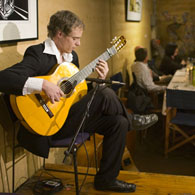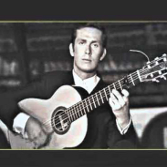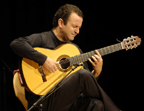Welcome to one of the most active flamenco sites on the Internet. Guests can read most posts but if you want to participate click here to register.
This site is dedicated to the memory of Paco de Lucía, Ron Mitchell, Guy Williams, Linda Elvira, Philip John Lee, Craig Eros, Ben Woods, David Serva and Tom Blackshear who went ahead of us.
We receive 12,200 visitors a month from 200 countries and 1.7 million page impressions a year. To advertise on this site please contact us.
|

|
|
Learning traditional flamenco vs learning modern flamenco
|
You are logged in as Guest
|
|
Users viewing this topic: none
|
|
Login  | |
|

   
Music88
Posts: 7
Joined: Apr. 9 2014

|
 Learning traditional flamenco vs lea... Learning traditional flamenco vs lea...
|
|
|
First, I'd like to thank mellowmel. He somewhat got me interested in doing a search about this. 
I've been reading lately some threads here on the subject.. found really useful information, but I still am not sure about a thing or two..
Well I love and listen to both traditional and modern flamenco. I might just give the edge to the neuvo stuff, it's what got me interested in flamenco in the first place, BUT that would be only by a little!
Now from what has been written here in previous threads, I can tell --and please correct me if I'm wrong!-- that neuvo flamenco is mainly "rumba flamenca" plus, maybe, the stuff played with the jazz flavors.. Now traditional can't be mistaken really and we talk here about.. Montoya, Sabicas, Paco Pena, early PDL stuff.. to name a few.
Now here's the thing..
As a beginner in flamenco, do I REALLY need to choose what I should focus on learning and make it my first priority, I mean between traditional and modern style?
I kinda got from what I've read here that these are two different disciplines and that we often see a serious flamenco player who can play rumba to some extent..and maybe see a serious rumba player who might know some or nothing about traditional flamenco..again correct me if I'm wrong!
If what I said was any true, then could you please tell me if what I'd basically need to learn and study was different in one style versus the other? Like what should be a must for me to learn first in either style?
Another thing please.. Rumba is arguably one of the flamenco palos, right? Now, I can hear a difference between let's say Entre Dos Aguas rumba and modern rumbas.. Could you tell me the differences exactly between traditional rumba and modern rumbas!
Excuse my ignorance guys, and thanks for your time!
Cheers!
|
|
|
|
REPORT THIS POST AS INAPPROPRIATE |
Date Apr. 16 2014 23:39:51
 |
|

   
aloysius
Posts: 233
Joined: Apr. 7 2005
From: Adelaide, Australia

|
 RE: Learning traditional flamenco vs... (in reply to Music88) RE: Learning traditional flamenco vs... (in reply to Music88)
|
|
|
Rumba is not that popular in modern flamenco - usually singers and guitarists put one rumba on an album. Buleria is probably the most popular of the palos in recent flamenco albums. Also the 'Jazz Flavors' thing is only a small section of modern flamenco - colourful chords have been with flamenco from the start as a way to match what the singers were doing, and as various flamenco players took on or were influenced by Spanish nationalist composers (Falla, Albeniz, Rodrigo, Turina etc) who were themselves highly influenced by the French impressionist school, more exotic chord voicings were tested out, well before jazz.
If what you really want to do is rumba, and it's of the Ottmar Liebert/Jesse Cook kind, it's best to see this as it's own genre pretty much unrelated to flamenco, and there are probably forums that specialise in that kind of music out there somewhere. Gypsy Kings is different and more closely related to flamenco. Or if you've heard a rumba that you dig from Tomatito or Vicente Amigo, then these people really know their flamenco. If that's where you want to go, then my guess is you will gradually get to like the main flamenco palos more and more, traditional as well as modern. And yes it's worth looking at some traditional stuff to play. It's a very long road ahead but it's also the best road there is.
_____________________________
www.guitarsketches.com
|
|
|
|
REPORT THIS POST AS INAPPROPRIATE |
Date Apr. 17 2014 10:29:27
 |
|

  
runner
Posts: 357
Joined: Dec. 5 2008
From: New Jersey USA

|
 RE: Learning traditional flamenco vs... (in reply to Music88) RE: Learning traditional flamenco vs... (in reply to Music88)
|
|
|
Music88, if it is your primary goal to play some sort of "flamenco" guitar to please yourself, then it doesn't much matter, it seems to me, whether you think it is this or that sort of "flamenco", if you like it and like playing it.
But if you want to learn about flamenco, Lenador's post is right on target. Flamenco began as singing, cante. The other disciplines--guitar, dance--were added on organically, early on, and are wonderful additional ways for the art to express itself. But cante remains the beating heart of flamenco. To know flamenco well, I think it is necessary to know "traditional" flamenco well--it didn't change that much, as far as we can tell, between the early 1900's (old recordings of Manuel Torres, for example) and the late 1980s, though obviously more palos entered the canon--some good, some not so much--and the growth of various fusions with other genres began to become more of a factor as time passed.
So, I would recommend some useful books first: Donn Pohren's classic The Art of Flamenco; also Paco Sevilla's biography of Carmen Amaya, Queen of the Gypsies, to list two. Then I would go on YouTube and check out videos of singers like Agujetas, Terremoto, Manuel Soto "el Sordera", Beni de Cadiz, La Perla de Cadiz, Chocolate, Rafael Romero--the list goes on and on, and you will get more names from the books I've mentioned.
Anyway, I think you will begin to get a good grip on what constitutes (or constituted) traditional flamenco, and then be in a better position to decide how and where you want to go, within a flamenco context, or somewhere else. A side benefit, but a very important one, will be that you will learn to know and maybe to really like the many other flamenco palos that are often buried alive under the emphasis on guitar and on bulerias, rumbas, soleares, etc., such as: la caña, serranas, malagueñas, saetas, martinete, etc. Just my view.
|
|
|
|
REPORT THIS POST AS INAPPROPRIATE |
Date Apr. 17 2014 14:38:37
 |
|

   
mark indigo
Posts: 3625
Joined: Dec. 5 2007

|
 RE: Learning traditional flamenco vs... (in reply to runner) RE: Learning traditional flamenco vs... (in reply to runner)
|
|
|
quote:
To know flamenco well, I think it is necessary to know "traditional" flamenco well--it didn't change that much, as far as we can tell, between the early 1900's (old recordings of Manuel Torres, for example) and the late 1980s
With some old forms, romances, corridas, tonas, martinete's, this might be true.
But a lot changed over the 20th Century, and a lot of the early recordings (what we call "traditional") were at the time fairly recent developments
I have read that Tientos was invented in the late 19th/early 20th Century as a slow syncopated introduction to the older Tangos.
But because it became so popular and there are so many old recordings of Tientos it was later assumed that Tientos was the original old "traditional" form.
Bulerías as we know it barely existed in the late 19th/early 20 Century, but it was in development - early recordings of Bulerías sound like what we would now call "Soleá por Bulerías" (a form which itself didn't exist, and which was originally called "Bulerías por Soleá")
Bulerías has sped up, and Soleá has slowed down.
early recordings of siguiriyas were fast, and it slowed over the course of the 20th Century, to the point where La Tana and Diego del Morao record siguiriyas fast and it's labelled as untraditional!
Paco de Lucia's style from the late 60's/early 70's, at the time of composition/recording considered cutting edge is now considered "traditional"
quote:
also Paco Sevilla's biography of Carmen Amaya, Queen of the Gypsies Paco Sevilla has three books, the first "In Search of Silverio", the second the Carmen Amaya book recommended, and the 3rd "Paco de Lucía: a new tradition for the flamenco guitar" They are all good, and each covers a different era in general as well as being about a particular figure in flamenco.
_____________________________
|
|
|
|
REPORT THIS POST AS INAPPROPRIATE |
Date Apr. 17 2014 16:14:26
 |
|

   
Leñador
Posts: 5237
Joined: Jun. 8 2012
From: Los Angeles

|
 RE: Learning traditional flamenco vs... (in reply to Music88) RE: Learning traditional flamenco vs... (in reply to Music88)
|
|
|
I think MOST guitar players outside of Spain overlook the importance of cante when they start out.
When first got interested in flamenco I didn't even know cante existed. Then once I discovered it, I didn't like it at all. I kept learning and listening eventually coming to the realization that there was no way I was going to get any further without some sort of appreciation for cante. So I began forcing myself to cultivate an appreciation. It slowly grew on me little by little and by the time I went to Spain I didn't love it, but I was okay with it. When I got to Spain and saw/heard it in person in tablao's pena's and parties it turned me completely, dunno what happened but I actually enjoyed it a lot after that. A little while later I found a teacher that could really help me with cante accompaniment. Let me tell you once you learn to accompany a few songs it's addicting. I'd rather play for cante then anything else, solo guitar, dancers, anything. My goal is to learn enough to be able to just hang out at a party in Spain, drink and play while everyone takes turns singing. I'd take that over a solo concert at carnegie hall any day.
If you REALLY want to learn flamenco just force yourself to listen to cante, eventually you'll "get it", it may take a while (took me 2 years of listening) but once you do it makes the art as a whole so much deeper and more interesting then cool licks and fancy finger rhythms.  and really, there's just no getting around it. and really, there's just no getting around it.
_____________________________
\m/
|
|
|
|
REPORT THIS POST AS INAPPROPRIATE |
Date Apr. 18 2014 0:49:58
 |
|

   
mellowmel
Posts: 85
Joined: Aug. 31 2006

|
 RE: Learning traditional flamenco vs... (in reply to Music88) RE: Learning traditional flamenco vs... (in reply to Music88)
|
|
|
This is a good topic and thanks for the thanks, Music88.
Lots of great comments here and that's why I just love this forum. With my learning experience though, like most flamenco guitar ppl here in the US, I first learned about flamenco (although not flamenco) through Armik, Liebert, Cook, etc. These guys opened the door for me and many ppl for sure. But then I learned that there is the "Real Deal" which was Paco, etc, and of course, the learning curve will most likely take you to traditional stuff like Sabicas etc to start learning with. Then as you further immerse yourself with this music and mature (whether its just your ears at first) you will naturally gravitate to what your heart REALLY desires. For me it's the not too melodic and the unpredictable modern stuff of MY generation. (Which is the last 15 yrs or so up to the present) I still learn the melodic stuff like "Tres Notas" by Vicente for example so I can play something easy on the fingers and the ears of the general public, but for my personal gratification, I prefer what I prefer and these are the pieces that I usually CAN'T play in front of an audience because they're too hard and acrobatic, jejeje.
Nike and Ricardo go it right - Just do it.
|
|
|
|
REPORT THIS POST AS INAPPROPRIATE |
Date Apr. 19 2014 1:21:22
 |
|
 New Messages New Messages |
 No New Messages No New Messages |
 Hot Topic w/ New Messages Hot Topic w/ New Messages |
 Hot Topic w/o New Messages Hot Topic w/o New Messages |
 Locked w/ New Messages Locked w/ New Messages |
 Locked w/o New Messages Locked w/o New Messages |
|
 Post New Thread
Post New Thread
 Reply to Message
Reply to Message
 Post New Poll
Post New Poll
 Submit Vote
Submit Vote
 Delete My Own Post
Delete My Own Post
 Delete My Own Thread
Delete My Own Thread
 Rate Posts
Rate Posts
|
|
|
Forum Software powered by ASP Playground Advanced Edition 2.0.5
Copyright © 2000 - 2003 ASPPlayground.NET |
0.09375 secs.
|


 Printable Version
Printable Version













 New Messages
New Messages No New Messages
No New Messages Hot Topic w/ New Messages
Hot Topic w/ New Messages Hot Topic w/o New Messages
Hot Topic w/o New Messages Locked w/ New Messages
Locked w/ New Messages Locked w/o New Messages
Locked w/o New Messages Post New Thread
Post New Thread